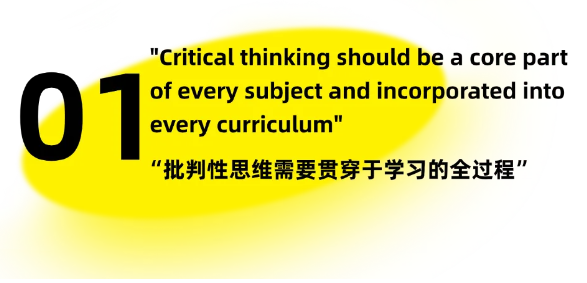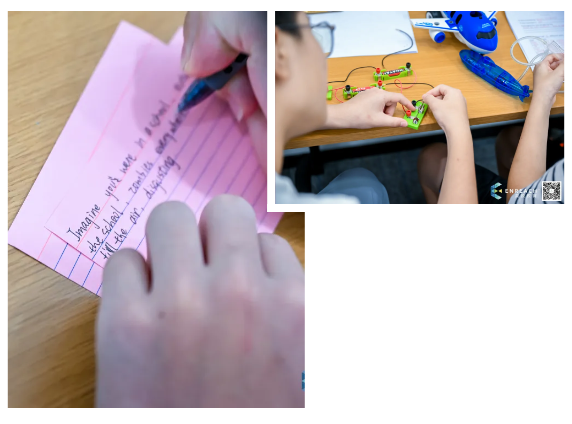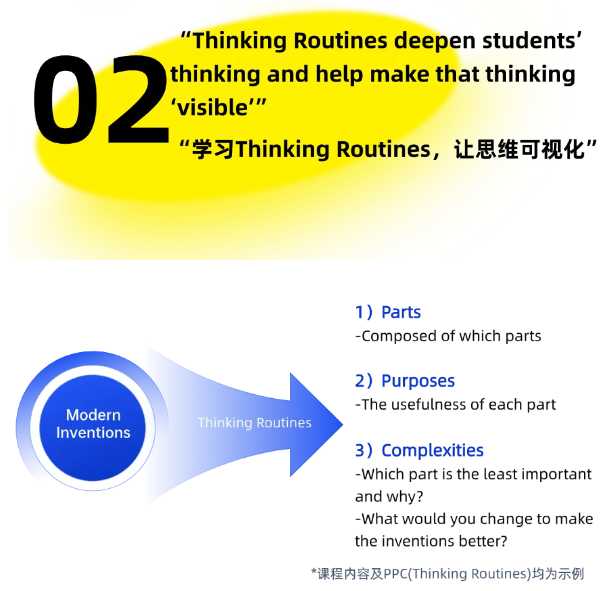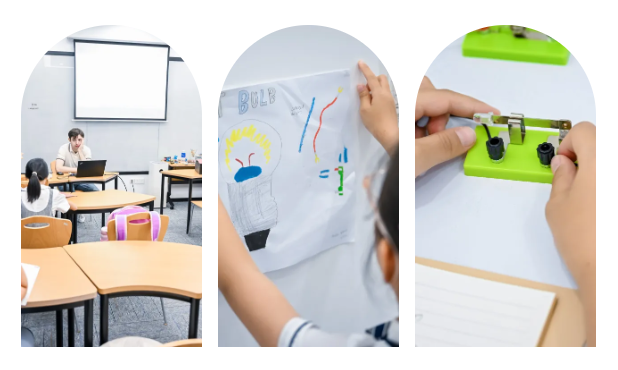
It seems like everywhere I look today, I see the term ‘critical thinking’ as something that is needed, or encouraged, or appreciated. Every course in every university. Every industry at every career level, from entry-level associates to top executives. In a world where people can find ways to disagree with each other on practically anything, everyone agrees that critical thinking is important.
如今,我似乎在任何地方都能看到 “批判性思维”这个词,在每一所大学的每一个课程中、在每一个行业的每一个职业层次上、从初级助理到高层管理人员,它都是必需的、被鼓励的、被赞赏的。在一个人们几乎可以在任何事情上找到分歧的社会环境中,每个人都同意批判性思维是重要的。 Why do we teach ‘Critical Thinking’ as a discipline? 为什么我们要把 “批判性思维”作为一门学科来教? In reality, critical thinking should not need to be a stand-alone discipline or subject. It should be a core part of every subject and incorporated into every curriculum. As we know however, the reality is quite different. Schools today are high-stakes testing environments with teachers and school managers under pressure to cover curriculums and to prepare for tests. Teachers tell students what to know, or what to do, and then have them practice that skill or knowledge. Retention of information is the goal. Understanding is a just a bonus. This is where the gap lies. To become better critical thinkers, our students need more than that. We need to help them not only learn to think but also think to learn. 实际上,批判性思维不应该是一门独立的学科或科目。它需要成为每个学科的核心部分,并纳入每个课程。然而,我们知道,现实情况却大相径庭。在如今的考试环境下,教师和学校管理者都面临着涵盖课程和准备考试的压力。教师告诉学生要知道什么或做什么,然后让他们练习技能或知识。能够掌握知识才是最终目标,理解只是起到锦上添花的作用,这便是其中存在的信息误差。想要拥有批判性思维,我们的学生需要的不仅仅是这些,相比于死记硬背式的知识获取,能够掌握学习的思维更为关键。

In daily life, we do not usually hear people’s thinking. We might hear the results of their thinking – an idea, an opinion, or a plan. In the classroom then, we need a way to make students’ thinking visible. To help us with that, we use ‘Thinking Routines’ developed by the nice people over at the Harvard Graduate School of Education on the ‘Project Zero’ team. A thinking routine is a set of questions or a brief sequence of steps used to scaffold and support student thinking. Thinking Routines deepen students’ thinking and help make that thinking “visible.” Thinking routines help to reveal students’ thinking to the teacher and also help students themselves to notice particular “thinking moves,” making those moves available and useful to them in other contexts. 在日常生活中,我们通常听不到人们的思考的过程,更多的是他们思考的结果——一个想法、一个观点或一个计划。因此,在课堂上,我们需要一种方法让学生的思考可视化。为了帮助我们做到这一点,我们使用了由哈佛大学教育研究生院“零点计划”团队的开发的 “思维路径(Thinking Routines)”。思维路径是一组问题或一连串简短的步骤,用于为学生的思考提供支架和支持,可以深化学生的思维,并有助于使思维“可见”。除此之外,思维路径有助于向教师展示学生的思维,也有助于学生自己注意到特定的“思考动作”,使这些动作在其他情境中也能使用并发挥作用。 At ENREACH, we generally focus on three key areas in Critical Thinking classrooms – Literature, History, and Culture. Critical thinking is also a key component of our Debate, Drama, and Public Speaking programs also. 如何实践这一过程呢?在英锐,我们的批判性思维课堂涵盖不同领域,比如文学、历史和文化等。批判性思维也将贯穿于辩论、戏剧和演讲课程。 For example, Literature deepens our thinking by bringing more awareness of our own values and worldview, and also those of others throughout the world and throughout history. We guide students not only to identify themes and character traits and major plot points – we encourage them to explore those themes and those character personalities and connect it to their own lives and experiences. What was it about Billy Weaver’s personality that made him vulnerable to the landlady in Roald Dahl’s classic ‘The Landlady’ and what can we learn from that? How can we connect Guy de Maupassant’s ‘The Necklace’, published in 19th century Paris to our lives in 21st century Shenzhen? How did the context of the Cold War influence Ray Bradbury when he wrote ‘The Last Night of the World’, and do we agree with his unfavorable view of humanity? 例如,文学会加深我们的思考,让我们更加了解自己与世界各地人们的价值观和世界观。我们不仅引导学生确定主题、人物特征和主要情节,还鼓励他们探索这些主题和人物个性,并将其与自己的生活和经历联系起来。在罗尔德·达尔的经典作品《女房东》中,是怎样的个性使得比利·韦弗容易受到女房东的伤害?我们如何将莫泊桑发表于19世纪巴黎的《项链》与21世纪深圳的生活联系起来?冷战的背景对雷·布拉德伯的《世界最后的夜晚》产生了怎样的影响? When it comes to culture and history,for many people though, History was a painful experience in school. Endless lists of dates, names and places to remember and regurgitate onto an exam paper. All of that might be still important in history classes around China and the world. In the critical thinking classroom however, that’s not the goal. Of course, if we spend 2 hours of a class with Ancient Persia as content matter, then it’s good if students can remember the main details of that. However, the real goal is reflecting on the legacy of that culture. Why was it important? How did Cyrus the Great’s ideas from 2,500 years ago influence the world? And, what do we think about it? Let’s put ourselves in his shoes and create a Universal Declaration of Student Rights! How easy or difficult was that to do? And, what did we learn about ourselves by doing that? 说到文化和历史,对许多人来说,在学校学习历史是一种痛苦的经历。无休止地记住日期、名字和地点,然后把它们倒背如流地写在试卷上。在目前的历史课堂上,这一切可能仍然很重要。然而,在批判性思维课堂上,这并不是我们的目标。当然,如果我们用两小时的时间来学习古波斯的内容,学生能记住其中的主要细节就不错了。然而,对于学生而言真正的目标是思考这种文化的遗产为什么重要?2500年前居鲁士大帝的思想是如何影响世界的?我们对此有何看法?现在的我们如果需要设身处地为他着想,制定一份《世界学生权利宣言》有多容易或多难?我们从中学到了什么? *翻译部分由小编与老师共同讨论完成,仅供参考
关于作者 Experienced in teaching——Oliver has over 17 years teaching experience in totalin France, Japan and China, with 9 years' teaching experience with chinese learners; received certificate in Teaching English to speakers of other Languages (TEsoL) from Trinity college London. 丰富的教学经验:Oliver老师拥有超过17年的教学经验,曾荣获圣三一TES0L国际英语教师资格证书,并于法国,日本以及中国任教。 Multiple public speaking experiences——He has delivered numerous public speeches on a Regional level in South china and at a National level in china at TeacherForums to teachers and teachertrainers and to broader audiences in the education industry. 公共演讲经验丰富:以教育发展倡导者的身份曾多次被邀请到中国南方地区与国家级教师论坛进行教育发展的分享。
想要孩子摆脱“茧房”的束缚? 能够经过时间检验 成长为更具判断力、更有思辨能力的选手? 不妨就从提升批判性思维入手 逐渐引导孩子打开视野吧~ <<< END >>>
免费留学评估




